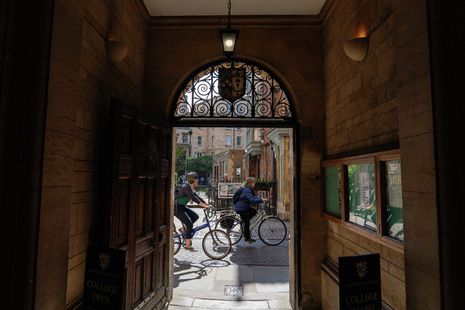JCRs pass motions in support of genocide amendment
The motion states that JCRs and MCRs have ‘a responsibility to support marginalised communities and combat any form of discrimination’

At least five JCRs across Cambridge - Newnham, Fitzwilliam, St Catharine’s, Magdalene and Selywn - along with Clare College MCR have all recently passed motions in support of the genocide amendment to the Trade Bill.
A copy of the motion seen by Varsity states that JCRs and MCRs have “a responsibility to support marginalised communities and combat any form of discrimination.”
In practice, the passing of the motion means that these JCRs and MCRs will “publicly support the Genocide Amendment,” and will use social media platforms for the purpose of “encouraging its members to use the genocideresponse.org letter to write to their constituency Members of Parliament ahead of the Genocide Amendment vote.”
The amendment, proposed by Lord Alton of Liverpool, has bounced between the House of Commons and the House of Lords since January, and would see the High Court of England and Wales make preliminary findings on cases of alleged genocide, crimes against humanity or war crimes on the part of countries with whom the UK wishes to make trade agreements.
The amendment would thus require a review of any bilateral trade agreement the UK government wishes to make with China. A 25,000-word report was published by a US-based thinktank, which found that the Chinese government had breached every article of the genocide convention in its treatment of Uighurs in Xingjiang. The Chinese Communist Party (CCP) has repeatedly denied claims relating to the treatment of Uighur Muslims.
As the passage of the genocide amendment to the Trade Bill continues to be processed in the Houses of Parliament, Varsity spoke to some of the JCRs and students who have collaborated with Stop Uighur Genocide (SUG) Cambridge to pass motions in support of the amendment.
Speaking to Varsity about the intended effect of these motions, SUG Cambridge expressed concerns that “the biggest problem currently facing the national campaign for Uyghur solidarity is awareness.”
They said that “students can have the most impact at this stage by increasing awareness and engaging others on the issue. We think a great way to do that is by getting student leaders at J/MCRs to learn about the topic and commit to engaging their members on the issue by sharing resources. The motions passed contain a commitment to doing this.”
Issy Roberts and Sherwood Cheung, respectively the President and International Officer for the Selwyn JCR, told Varsity that the JCR passed this motion “as we believe that the protection of human rights wherever and whenever it may occur is in line with our values of encouraging strength through diversity and upholding respect for all students regardless of ethnic or religious background.”
Roberts and Cheung added that a Selwyn undergraduate student involved in SUG Cambridge presented the motion at a JCR Open Meeting on February 20th, where the motion was passed unanimously, with “no concerns [...] raised amongst attendees or indeed following the passage of the motion.”
The student who proposed the motion to the Magdalene JCR told Varsity that “It is vital that we as members of civil society do what is in our power to speak out against atrocities even when the majority of us do not experience them directly. Cambridge colleges in particular are privileged with a degree of influence thanks to our reputation, which we can and should use when the opportunity arises.”
The student continued: “The Genocide Amendment is one such opportunity, a chance for us to demand government take a principled stand by not engaging in bilateral preferential trade agreements with those who stand guilty of genocide. The wording of the motion was designed to recognise this responsibility to speak out at critical junctures like the Genocide Amendment, and Magdalene College JCR in passing our motion have endorsed this sentiment. We also drew particular attention to the case of China, as the atrocities faced by Uyghur Muslims provided the impetus for the Genocide Amendment amidst rumours of planned trade deals post-Brexit.”
They added that they will lobby the JCR to back any future open letters or petitions which relate to the genocide amendment.
Meanwhile Rory Cockshaw, President of the St Catharine’s JCR, said that they “have historically been rather neutral on all sorts of political matters, but that “student politics has got the capacity to make a change in the wider world”, and that “we, as the JCR Committee, exist to represent the interests of our students at national level”. Cockshaw added that “now we have voted to support SUG Cambridge formally, we are in a much better position to respond quickly and without deliberation if and when SUG Cambridge further their cause with taking further action.”
The JCR spokespeople also addressed the risk of students coming from countries with human rights abuses, specifically Chinese students, perceiving the motion to be taking a stance against China.
Cockshaw in particular said this concern had been raised during an Open Meeting of the St Catharine’s JCR regarding the motion, saying that “we all firmly believe that we do not have the democratic mandate to put a single one of our members at risk in any way, and so it should really be emphasised that the stance we took was simply the majority stance of those students who attended the Forum that we held on the matter.”
Cockshaw added that mitigation risks included drafting three different Motions, “each successively watered down from the original Motion of very active and vocal support”, in order to minimise “any feeling of our members of having been dragged along against their will by a JCR that might be interpreted as taking a stance against China.”
Roberts added that while no concerns were raised by any members of the Chinese community at Selwyn to the JCR, the JCR “unequivocally denounces any targeting of international students or members of any ethnic group”, and that it will be running a workshop entitled ‘Get Educated’ which “will be focusing on increasing hostility and racism towards Chinese students.”
Varsity understands that Selwyn MCR had also initially proposed a motion in support of the genocide amendment, but withdrew discussions surrounding the motion at short notice.
A spokesperson for Selwyn MCR told Varsity that “after consulting the college, [the MCR leadership] decided to postpone the open meeting because of well-founded concerns about the safety of individual students.
These included potential risks for students from particular national and ethnic groups who were participating and the added security issue of meetings conducted by video. The college therefore supported the MCR leadership’s view that this particular open meeting should be cancelled, and that the debate should continue in other forums in the coming months. In the meantime, every individual in the college has an absolute right to speak out on this issue and all others.”
When asked about the potential risks to students from countries where these events are taking place, SUG Cambridge stated that: “To ensure the safety of [these students] who may sit on their J/MCR committees, we recommend a secret vote on the motion.”
They also emplored J/MCRs to “keep the strictest standards on this to ensure [these students] are safe and welcome here, and have the opportunity to share and enjoy their cultural, linguistic, gastronomic and other ties to China and their families.”
Varsity contacted Newnham and Fitzwilliam JCRs, as well as Clare MCR, for comment.
 News / Cambridge academics stand out in King’s 2026 Honours List2 January 2026
News / Cambridge academics stand out in King’s 2026 Honours List2 January 2026 Interviews / You don’t need to peak at Cambridge, says Robin Harding31 December 2025
Interviews / You don’t need to peak at Cambridge, says Robin Harding31 December 2025 Comment / What happened to men at Cambridge?31 December 2025
Comment / What happened to men at Cambridge?31 December 2025 News / Varsity’s biggest stories of 202531 December 2025
News / Varsity’s biggest stories of 202531 December 2025 Features / “It’s a momentary expression of rage”: reforming democracy from Cambridge4 January 2026
Features / “It’s a momentary expression of rage”: reforming democracy from Cambridge4 January 2026











